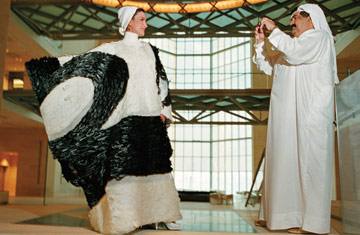
CENTER STAGE: The Emir lets Mozah play a key role
What's your role in reforming Qatar?
His Highness believes that in order to guarantee sustainable development, you have to start with education. The public system we have is stagnant and outmoded, and the foreign schools in Qatar didn't cater to our national needs. He gave me a free hand to implement these social reforms, trusting that I would be able to translate his vision into reality. We are trying to instigate changes in Qatar. We believe our people deserve the best. If we do not utilize all the wealth that we have in the interests of our people, history will judge us.
It's unusual for a First Lady in the conservative Gulf countries to be involved in such issues.
His Highness is a very confident man. He knows that I understand him best and know what he has in mind, that I can execute his vision. I'm not there for the sake of a photo opportunity.
Does your public visibility have an impact on young women in Qatar?
I think they understand that you don't need to lose your Arab identity to be modern. There were some voices trying to drag us to the stereotype of the feminist movement. Another stream followed the very conservative way, that women have to be covered, confined to houses and not participate in activities. For me, we need to find our own way. Women should not be pressured to follow the international mainstream. To be modern you don't need to be in the workforce. We have to cherish our culture and heritage and at the same time be modern.
Do you agree with critics who blame Islam for holding women back?
The gender gap is not due to Islam. In the golden age of Islam, women were participating in every aspect of their societies. Look at the men. They are also oppressed. This is the problem: politics, the political agendas that some people are using to suppress their citizens, and traditions that existed even before Islam. Those traditions can play to the interests of some politicians.
How serious is the gender gap?
It is serious as part of the huge scale of human violation that is taking place today in this part of the world. People will burst someday. People can see what's going on in the world. They want the same quality of life that other people are enjoying when it comes to freedom and enjoying rights and expressing opinions.
In talking about political oppression you're using unusually tough language.
We have to be serious about our problems and shortfalls. It's time to have self-reflection and self-criticism if we are really genuine about our reforms and if we want to make a historical change. I'm not a politician. I just want the best for our region.
When the Emir launched al-Jazeera, was that courageous or reckless?
We are independent. People know that if we are doing this, we are not trying to provoke or act on behalf of anybody, but because we believe in it. The debate was: Are you ready for democracy? If you talk to any Arab leader, they might say people are not ready. Al-Jazeera was a tool to contradict this commonplace thought. Al-Jazeera showed that the people were more ready than their leaders. The platform was set for people to express their opinion, to show their leaders: We are ready, just give us the chance.